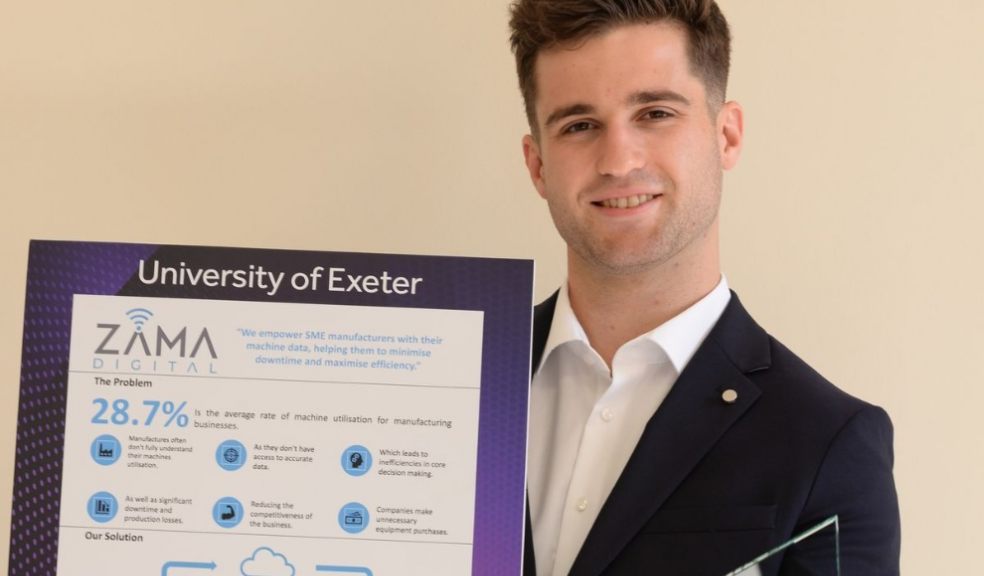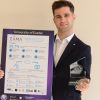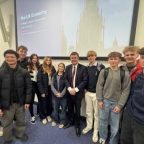
University of Exeter Student Wins Start Up Prize in National Engineering Competition
Twenty-three-year-old James Tetlow, a Mechanical Engineering student from the University of Exeter, has been awarded a top prize in the annual Engineers in Business Competition which pits teams of university engineering student innovators against each other to win seed funding to progress their business idea.
James won £1,500 for his venture, Zama Digital, a machine monitoring solution for the manufacturing. James pitched against nine other teams of student and graduate innovators in the national final to win runner-up prize in the ‘Start Up’ category.
The competition is sponsored by the registered charity, Engineers in Business Fellowship which champions business education for engineers and supports universities by giving them grants to award prizes to students who develop ground-breaking ideas. The grants enable universities to inspire more engineering and technology students and post-graduates to participate in innovation and entrepreneurship, skills that they take into their careers.
Zama Digital - A Machine Monitoring Solution Set to Transform the Manufacturing Industry Zama Digital provides a machine monitoring solution for manufacturing businesses. The Zama sensor module is retrofitted to production machinery of any age, make or model, and is used to monitor the utilisation of the machine. Using Zama Digital, various information, including cycle times, total uptime and downtime, is collected from the machines. This data is then displayed in real time on Zama’s cloud-based platform, providing manufacturers with quick and easy access to information that will help to improve the efficiency and profitability of their operations.
It was during the industrial placement year of his university degree that James became inspired to create Zama Digital as he explains: “During my placement I worked at a subcontract manufacturing company alongside the chairman of the business. We wanted to collect data from many different machines of varying types, ages, makes, and models to understand the current machine utilisation, and increase efficiency and productivity as you can’t improve what you don’t measure. However, there wasn’t a solution on the market that had the flexibility to collect data from a large range of different machines and share it on a cloud platform for analysis. With this in mind, Zama Digital was born.
The Engineers in Business competition is designed to inspire engineers to study business and innovation. James said, “It’s important to learn business innovation skills as it teaches you how to implement new products, services, processes, and ideas. When done successfully, these new innovations can have many positive impacts on a business, such as reducing costs and process times as well as increasing the efficiency and sustainability of the company.”
Commenting on his success in the Champion of Champions Final, James said: “I am very happy to have received an award from the final, a lot of hard work had gone into developing Zama Digital, and it was great for that to be recognised. The prize money will contribute to some exciting software developments we have planned that will improve the user experience for the companies we work with. Taking part in the Grand Final meant I received a coaching and mentoring session from a Sainsbury Management Fellow. During this session, we refined my pitch deck for the final and was given some key tips on what to include in the presentation and how to deliver the pitch on the night.”
Head Judge, Sainsbury Management Fellow Serge Taborin, Government Transformation at Amazon Web Services was delighted with the standard of the competition, “All the finalists were absolutely brilliant. They only had three minutes to pitch but they were thoroughly prepared and communicated their ideas with clarity and passion. Every one of the teams should feel proud of themselves. It was exceptionally difficult to choose between them all. Although the format of the competition required us to pick a winner on the night, it really came down to a few details. But all finalists should remember that by making it to the final, they are all winners, and their products clearly have potential.”





















